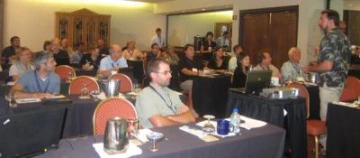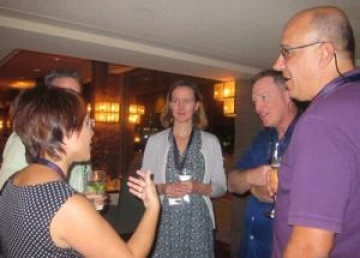When
Where
The University of Arizona Superfund Research Program (UA SRP) hosted the “Epigenetic Actions of Environmental Arsenicals” workshop on September 20-22, 2012 in Tucson, AZ.
Goal
A major goal of this workshop was to integrate distinct scientific perspectives into a cohesive transdisciplinary understanding of the epigenetic consequences of environmental arsenic exposure.
Highlights of the event

Epigenetic Actions of Environmental Arsenicals workshop participants
The University of Arizona Superfund Research Program (UA SRP) hosted the “Epigenetic Actions of Environmental Arsenicals” workshop on September 20-22, at Loews Ventana Canyon in Tucson, AZ. The workshop was funded by the National Institute of Environmental Health Sciences (NIEHS).
Epigenetics is the study of heritable changes that occur without a change in DNA sequence – or as presenter Dr. Ting Wang (Washington University) humorously summed it up, “a line I learned from American sitcoms aptly describes epigenetics: ‘it’s not what you said, it’s how you said it!’”

Meeting participants including Danielle Carlin, NIEHS (left) and host Dr. Bernie Futscher, UA SRP (right) keep up the scientific discussions at dinner
The importance of epigenetics as a mechanism for the effects of environmental exposures continues to gain appreciation, and this workshop brought together more than 40 scientists from academia, industry, and government to work toward a better understanding of epigenetics in environmental health. Presenters ranged from graduate trainees to leaders in the field, and covered a breadth of subjects from epidemiology, toxicology, biology, and model systems to epigenetic techniques and technologies. Workshop participants had ample opportunities for discussion and networking. In addition, they enjoyed Tucson’s warm weather and casual atmosphere, and got to enjoy star-gazing, desert creatures, and Mexican food! Dr. Erik Tokar (NIEHS) declared, “this is the first presentation I have ever given in shorts!”
Overall, the workshop was highly successful. Stay tuned for an expanded description of the workshop on our website, as well as a white paper summarizing the outcomes.
Learn more
Related Projects
Epigenetic actions of environmental arsenicals (2010-2015)
Funding
The workshop was funded by the National Institute of Environmental Health Sciences (NIEHS).


